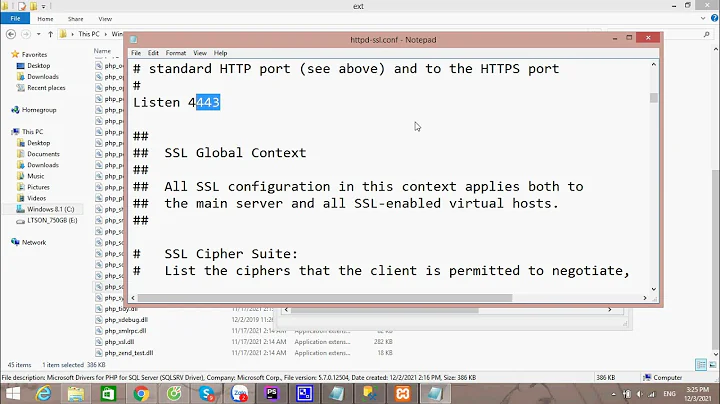PHP_SELF vs PATH_INFO vs SCRIPT_NAME vs REQUEST_URI
Solution 1
The PHP documentation can tell you the difference:
'PHP_SELF'
The filename of the currently executing script, relative to the document root. For instance, $_SERVER['PHP_SELF'] in a script at the address http://example.com/test.php/foo.bar would be /test.php/foo.bar. The __FILE__ constant contains the full path and filename of the current (i.e. included) file. If PHP is running as a command-line processor this variable contains the script name since PHP 4.3.0. Previously it was not available.
'SCRIPT_NAME'
Contains the current script's path. This is useful for pages which need to point to themselves. The __FILE__ constant contains the full path and filename of the current (i.e. included) file.
'REQUEST_URI'
The URI which was given in order to access this page; for instance, '/index.html'.
PATH_INFO doesn't seem to be documented...
Solution 2
Some practical examples of the differences between these variables:
Example 1.
PHP_SELF is different from SCRIPT_NAME only when requested url is in form:
http://example.com/test.php/foo/bar
[PHP_SELF] => /test.php/foo/bar
[SCRIPT_NAME] => /test.php
(this seems to be the only case when PATH_INFO contains sensible information [PATH_INFO] => /foo/bar) Note: this used to be different in some older PHP versions (<= 5.0 ?).
Example 2.
REQUEST_URI is different from SCRIPT_NAME when a non-empty query string is entered:
http://example.com/test.php?foo=bar
[SCRIPT_NAME] => /test.php
[REQUEST_URI] => /test.php?foo=bar
Example 3. REQUEST_URI is different from SCRIPT_NAME when server-side redirecton is in effect (for example mod_rewrite on apache):
[REQUEST_URI] => /test.php
[SCRIPT_NAME] => /test2.php
Example 4.
REQUEST_URI is different from SCRIPT_NAME when handling HTTP errors with scripts.
Using apache directive ErrorDocument 404 /404error.php
http://example.com/test.php
[REQUEST_URI] => /test.php
[SCRIPT_NAME] => /404error.php
On IIS server using custom error pages
http://example.com/test.php
[SCRIPT_NAME] => /404error.php
[REQUEST_URI] => /404error.php?404;http://example.com/test.php
Solution 3
PATH_INFO is only available when using htaccess like this:
Example 1
RewriteCond %{REQUEST_FILENAME} !-f
RewriteCond %{REQUEST_FILENAME} !-d
RewriteCond %{REQUEST_URI} !^(favicon\.ico|robots\.txt)
RewriteRule ^(.*)$ index.php/$1 [L]
Remains the same
[SCRIPT_NAME] => /index.php
Root
[PHP_SELF] => /index.php
[PATH_INFO] IS NOT AVAILABLE (fallback to REQUEST_URI in your script)
[REQUEST_URI] => /
[QUERY_STRING] =>
Path
[PHP_SELF] => /index.php/test
[PATH_INFO] => /test
[REQUEST_URI] => /test
[QUERY_STRING] =>
Query String
[PHP_SELF] => /index.php/test
[PATH_INFO] => /test
[REQUEST_URI] => /test?123
[QUERY_STRING] => 123
Example 2
RewriteCond %{REQUEST_FILENAME} !-f
RewriteCond %{REQUEST_FILENAME} !-d
RewriteCond %{REQUEST_URI} !^(favicon\.ico|robots\.txt)
RewriteRule ^(.*)$ index.php?url=$1 [L,QSA]
Remains the same
[SCRIPT_NAME] => /index.php
[PHP_SELF] => /index.php
[PATH_INFO] IS NOT AVAILABLE (fallback to REQUEST_URI in your script)
Root
[REQUEST_URI] => /
[QUERY_STRING] =>
Path
[REQUEST_URI] => /test
[QUERY_STRING] => url=test
Query String
[REQUEST_URI] => /test?123
[QUERY_STRING] => url=test&123
Example 3
RewriteCond %{REQUEST_FILENAME} !-f
RewriteCond %{REQUEST_FILENAME} !-d
RewriteCond %{REQUEST_URI} !^(favicon\.ico|robots\.txt)
RewriteRule ^(([a-z]{2})|(([a-z]{2})/)?(.*))$ index.php/$5 [NC,L,E=LANGUAGE:$2$4]
or
RewriteRule ^([a-z]{2})(/(.*))?$ $3 [NC,L,E=LANGUAGE:$1]
RewriteCond %{REQUEST_FILENAME} !-f
RewriteCond %{REQUEST_FILENAME} !-d
RewriteCond %{REQUEST_URI} !^(favicon\.ico|robots\.txt)
RewriteRule ^(.*)$ index.php/$1 [L]
Remains the same
[SCRIPT_NAME] => /index.php
Root
[PHP_SELF] => /index.php
[PATH_INFO] IS NOT AVAILABLE (fallback to REQUEST_URI in your script)
[REQUEST_URI] => /
[QUERY_STRING] =>
[REDIRECT_LANGUAGE] IS NOT AVAILABLE
Path
[PHP_SELF] => /index.php/test
[PATH_INFO] => /test
[REQUEST_URI] => /test
[QUERY_STRING] =>
[REDIRECT_LANGUAGE] =>
Language
[PHP_SELF] => /index.php/
[PATH_INFO] => /
[REQUEST_URI] => /en
[QUERY_STRING] =>
[REDIRECT_LANGUAGE] => en
Language path
[PHP_SELF] => /index.php/test
[PATH_INFO] => /test
[REQUEST_URI] => /en/test
[REDIRECT_LANGUAGE] => en
Language Query string
[PHP_SELF] => /index.php/test
[PATH_INFO] => /test
[REQUEST_URI] => /en/test?123
[QUERY_STRING] => 123
[REDIRECT_LANGUAGE] => en
Solution 4
PHP Paths
$_SERVER['REQUEST_URI'] = Web path, requested URI
$_SERVER['PHP_SELF'] = Web path, requested file + path info
$_SERVER['SCRIPT_NAME'] = Web path, requested file
$_SERVER['SCRIPT_FILENAME'] = File path, requested file
__FILE__ = File path, current file
Where
-
File path is a system file path like
/var/www/index.php, after alias resolution -
Web path is a server document path like
/index.phpfromhttp://foo.com/index.php, and may not even match any file - Current file means the included script file, not any script that includes it
- Requested file means the includer script file, not the included one
-
URI is the HTTP request like
/index.php?foo=bar, before any URL rewriting - Path info is any extra Apache data located after the script name but before the query string
Order of Operation
- Client sends server an HTTP request
REQUEST_URI - Server performs any URL rewriting from .htaccess files, etc. to get
PHP_SELF - Server separates
PHP_SELFintoSCRIPT_FILENAME+PATH_INFO - Server performs alias resolution and converts the entire url path to a system file path to get
SCRIPT_FILENAME - Resulting script file may include others, where
__FILE__refers to the path to the current file
Solution 5
You may want to look into the URI Class and make use of $this->uri->uri_string()
Returns a string with the complete URI.
For example, if this is your full URL:
http://example.com/index.php/news/local/345
The function would return this:
/news/local/345
Or you could make use of the segments to drill down specific areas without having to come up with parsing/regex values
Related videos on Youtube
Eli
Updated on July 08, 2022Comments
-
Eli almost 2 years
I am building a PHP application in CodeIgniter. CodeIgniter sends all requests to the main controller:
index.php. However, I don't like to seeindex.phpin the URI. For example,http://www.example.com/faq/whateverwill route tohttp://www.example.com/index.php/faq/whatever. I need a reliable way for a script to know what it's address is, so it will know what to do with the navigation. I've usedmod_rewrite, as per CodeIgniter documentation.The rule is as follows:
RewriteEngine on RewriteCond $1 !^(images|inc|favicon\.ico|index\.php|robots\.txt) RewriteRule ^(.*)$ /index.php/$1 [L]Normally, I would just check
php_self, but in this case it's alwaysindex.php. I can get it fromREQUEST_URI,PATH_INFO, etc., but I'm trying to decide which will be most reliable. Does anyone know (or know where to find) the real difference betweenPHP_SELF,PATH_INFO,SCRIPT_NAME, andREQUEST_URI? Thanks for your help!Note: I've had to add spaces, as SO sees the underscore, and makes it italic for some reason.
Updated: Fixed the spaces.
-
Eli over 15 yearsIs it always the complete URI?
-
David Padbury over 15 yearsTypically, you can run into issues with apache on windows, but it's only for URI's that don't resolve.
-
Eli over 15 yearsThank you - this is a good idea, but I am using these in a pre-system hook that will need to run before the controller is up and running.
-
Alix Axel almost 14 years+1, "An example is not a way to learn, it's the only way to learn." - I always have to recheck this stuff, very nice research on the 404 errors. =)
-
 Marco Demaio about 13 years+1: 1st time in my life I understood the difference. They should update PHP documentaion with your answer
Marco Demaio about 13 years+1: 1st time in my life I understood the difference. They should update PHP documentaion with your answer -
Kenneth over 12 yearsWhy reinvent the wheel? This data is much more easily accessed!
-
SimonSimCity about 12 yearsThis is most likely not about the PHP documentation but the CGI :) And there PATH_INFO is documented: tools.ietf.org/html/rfc3875#section-4 But there are some known issues that Apache and nginx are not always giving this variable.
-
 Dawid Ohia about 12 yearsExample1: [SCRIPT_NAME] => /test.php/ There should be no "/" at the end: Example1: [SCRIPT_NAME] => /test.php Anyway that's what I see in PHP 5.3.6 . Nice examples.
Dawid Ohia about 12 yearsExample1: [SCRIPT_NAME] => /test.php/ There should be no "/" at the end: Example1: [SCRIPT_NAME] => /test.php Anyway that's what I see in PHP 5.3.6 . Nice examples. -
Odin about 12 yearsYou are correct JohnM2, i have now checked on PHP 5.4 and the result for URL /pinfo.php/first/second?third=fourth is as follows: QUERY_STRING => third=fourth REQUEST_URI => /pinfo.php/first/second?third=fourth SCRIPT_NAME => /pinfo.php PATH_INFO => /first/second
-
 Gabriel Fair about 12 yearsThis was great. Thanks for your help!
Gabriel Fair about 12 yearsThis was great. Thanks for your help! -
 Fabrício Matté over 11 yearsI've tested this on 5.2.17 too and there's no
Fabrício Matté over 11 yearsI've tested this on 5.2.17 too and there's no/at the end of theSCRIPT_NAME. This seems to be consistent in PHP 5.2-5.4 then, considering editing the answer to reflect that. -
 icc97 over 10 yearsYou missed off
icc97 over 10 yearsYou missed offREQUEST_URIvsPHP_SELFhere they differ if you request example.com :[REQUEST_URI] => /and[PHP_SELF] => /index.php -
ChandlerQ over 9 yearsThis is very helpful especially the Example 4 error handling part. Recently I find that some programmers are using
REQUEST_URIas conditions, then provide different header/footer respectively. It works in most cases but will have problems with 404/403 pages. I think a better way is to useSCRIPT_NAMEto get the REAL requested page on Apache. -
 Admin over 8 yearsOdin's answer below adds useful explanations that are complemented with examples. I find it hard to understand what these variables represent in a general context with a path_info, a query string, some redirection, some aliases, on different operating systems, from CLI vs SERVER, etc.
Admin over 8 yearsOdin's answer below adds useful explanations that are complemented with examples. I find it hard to understand what these variables represent in a general context with a path_info, a query string, some redirection, some aliases, on different operating systems, from CLI vs SERVER, etc. -
 Admin over 8 yearsThis is good. Here are my comments. First, both $_SERVER['SCRIPT_NAME'] and $_SERVER['SCRIPT_FILENAME'] are script name, except that the later is after aliases are executed. Second, $_SERVER['PHP_SELF'] is not the script, but the script + the path info. Again, $_SERVER['SCRIPT_NAME'] is the script (before aliases). Finally, it is useful to know at what stage, after or before rewrite-rules, after or before aliases, these variables are defined. See my answer.
Admin over 8 yearsThis is good. Here are my comments. First, both $_SERVER['SCRIPT_NAME'] and $_SERVER['SCRIPT_FILENAME'] are script name, except that the later is after aliases are executed. Second, $_SERVER['PHP_SELF'] is not the script, but the script + the path info. Again, $_SERVER['SCRIPT_NAME'] is the script (before aliases). Finally, it is useful to know at what stage, after or before rewrite-rules, after or before aliases, these variables are defined. See my answer. -
 Beejor over 8 yearsHi Dominic108, thanks for the revision. I do think it's useful to include the rewrite info. To me it was implied, but to others it may not be that intuitive.
Beejor over 8 yearsHi Dominic108, thanks for the revision. I do think it's useful to include the rewrite info. To me it was implied, but to others it may not be that intuitive. -
 Beejor over 8 years@Dominic108 I revised my answer based on your suggestions, tidied things up a bit, and added an Order of Operation section. Let me know what you think. Thanks!
Beejor over 8 years@Dominic108 I revised my answer based on your suggestions, tidied things up a bit, and added an Order of Operation section. Let me know what you think. Thanks! -
 Admin over 8 yearsIn your order, you have to swap
Admin over 8 yearsIn your order, you have to swap$_SERVER['SCRIPT_NAME']and$_SERVER['PHP_SELF'], because mod_rewrite create the entire path, which is$_SERVER['PHP_SELF']. The separation occurs next. Note that aliases also consider the entire path to define the script filename, but the separation that defined script_name and path_info already occurred, so they will not be affected. -
 Admin over 8 yearsI know that it is not part of the question, but it is useful to mention that
Admin over 8 yearsI know that it is not part of the question, but it is useful to mention that[REQUEST_URI]is defined before URL rewriting, including mod_dir rewrite as pointed out by @icc97.[PHP_SELF] = [SCRIPT_NAME] + [PATH_INFO]is defined after mod_dir and mod_rewrite, but before aliases are resolved. Aliases can change the complete URL path (which PHP names[PHP_SELF]) to obtain the[SCRIPT_FILENAME], which is the actual script on the file system. To be slightly more complete, let's add that the script can include other files and__FILE__is the current file. -
 Admin over 8 yearsExample 1 also says that
Admin over 8 yearsExample 1 also says that[REQUEST_URI]is different from[SCRIPT_NAME]when[PATH_INFO]is not empty. It was understood, but it was not explicitly written. Example[REQUEST_URI] => /test.php/foo.bar, [SCRIPT_NAME] => /test.php -
 Admin over 8 yearsThis answer is written in a way that suggests that only url rewritting can create a path_info, but, of course, the path info can be entered directly in the original URL.
Admin over 8 yearsThis answer is written in a way that suggests that only url rewritting can create a path_info, but, of course, the path info can be entered directly in the original URL. -
 Beejor over 8 years@Dominic108 I revised my answer again. For some reason your edit proposal was rejected, though as far as I know, you are correct that two of my items were out of order. I'm not as familiar with aliases, so I'm relying on your expertise for that part. Thanks again!
Beejor over 8 years@Dominic108 I revised my answer again. For some reason your edit proposal was rejected, though as far as I know, you are correct that two of my items were out of order. I'm not as familiar with aliases, so I'm relying on your expertise for that part. Thanks again! -
MrWhite over 7 yearsAnd there is additional complexity if the original request is expected to have a query string. In its current state, the above code will simply overwrite the query string. If you merge query strings (
QSAflag) then query string params can potentially be overwritten (for instance, if you needed aurlparam on the initial request) or worse, be vulnerable to XSS attacks. -
 dallin over 5 years-1 Just as an explanation as to why I downvoted: the entire reason I came to this post is because the documentation is not clear. Odin's answer below provides a clear explanation of the differences between these variables. I feel like it's an insufficient answer to just copy and paste easily found yet also insufficient documentation. I believe most people would have had to already visit the documentation to even know about the list of elements in the $_SERVER variable mentioned above.
dallin over 5 years-1 Just as an explanation as to why I downvoted: the entire reason I came to this post is because the documentation is not clear. Odin's answer below provides a clear explanation of the differences between these variables. I feel like it's an insufficient answer to just copy and paste easily found yet also insufficient documentation. I believe most people would have had to already visit the documentation to even know about the list of elements in the $_SERVER variable mentioned above. -
Brad Kent over 5 yearsworth noting this apache bug: bz.apache.org/bugzilla/show_bug.cgi?id=40102
-
Jamie Robinson about 5 yearsAlso worth putting in an example of domain traversal, as they differ in this way as well. For instance in
http://example.com/something/../test.php, the REQUEST_URI will be/something/../test.phpand the SCRIPT_NAME will be/test.php. :)












